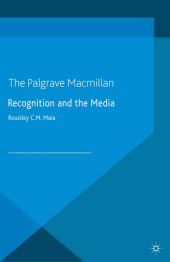 Neuerscheinungen 2014Stand: 2020-02-01 |
Schnellsuche
ISBN/Stichwort/Autor
|
Herderstraße 10
10625 Berlin
Tel.: 030 315 714 16
Fax 030 315 714 14
info@buchspektrum.de |

R. Maia
Recognition and the Media
1st ed. 2014. 2014. xvi, 293 S. 216 mm
Verlag/Jahr: SPRINGER PALGRAVE MACMILLAN; PALGRAVE MACMILLAN UK 2014
ISBN: 1-349-45664-0 (1349456640)
Neue ISBN: 978-1-349-45664-2 (9781349456642)
Preis und Lieferzeit: Bitte klicken
This collection examines Axel Honneth´s theory of recognition and the crucial role played by the media in struggles for recognition. It brings together debates on controversial aspects of Honneth´s work and a set of intriguing empirical studies including with slum-dwelling adolescents, leprosy patients and women exposed to child labor exploitation
1. Introduction 2. Axel Honneth´s Theory of Recognition as a Research Program PART I: MASS MEDIA: A SITE OF STRUGGLE 3. Mass Media Representation, Identity-Building and Social Conflicts: Towards a Recognition-Theoretical Approach 4. The Morality of Recognition: Adolescent Slum-Dwellers Discuss a TV Series Representation of their Lives 5. Recognition and Ideology: Assessing Justice and Injustice in the Case of Child Domestic Labor PART II: STRUGGLE THROUGH SOCIAL NETWORK SITES 6. Struggles for Recognition in a Digital Era 7. Recognition, Feelings of Injustice and Claim Justification: Deaf People´s Storytelling on the Internet 8. Recognition as an Ongoing Struggle: Conflicts Involving Racism and Homophobia in the Networked Media Environment PART III: STRUGGLE, MEDIA AND THE DYNAMICS OF CULTURAL CHANGE 9. Media, Cultural Change and the Dynamics of Recognition 10. Recognition without Struggles: Leprosy in Brazilian Daily Newspapers 11. Recognition and Moral Progress: Discourses on Disability in the Media 12. Conclusion
´Recognition and the Media presents the first in-depth investigation into the complex interactions between modern communication systems and the relations of recognition at the heart of contemporary societies. With its wealth of empirical evidence and the many theoretical refinements it proposes, the book significantly advances one of today´s most
lively research paradigms.´
Jean-Philippe Deranty, Macquarie University, Australia
´While it is broadly recognized that social movement action goes beyond the defence of specific interests, the moral dimension of their political claims is rarely analyzed. Linking in theory and empirical research as well as struggles for recognition by disadvantaged groups with communication, this book offers very interesting insights into a most relevant topic for
social movement and communication studies.´
Donatella della Porta, Professor of Political and Social Sciences, European University Institute, Italy
´While the notion of recognition has become central to contemporary critical theory, empirical applications have been limited. Happily we now have Rousiley Maia´s compelling volume, which lucidly shows how in both mass media and social media the struggles over recognition (and misrecognition) link directly to issues of justice, accountability and democracy. A ground-breaking effort!´
Peter Dahlgren, Lund University, Sweden
´Rousiley Maia has written a superb book with great moral implications of how the media treat underprivileged groups. Her key theoretical concept is recognition and her case studies are from Brazil, with relevance for the media everywhere.´
Jürg Steiner, University of North Carolina at Chapel Hill, U.S., and University of Bern, Switzerland


